Marijuana Legalization Support at Record High
While a majority still supports criminalization, more Americans than ever think marijuana should be legal, according the latest Gallup survey. Lydia Saad (a family friend) provides the analysis:
Gallup’s October Crime poll finds 44% of Americans in favor of making marijuana legal and 54% opposed. U.S. public support for legalizing marijuana was fixed in the 25% range from the late 1970s to the mid-1990s, but acceptance jumped to 31% in 2000 and has continued to grow throughout this decade.
The question wording is interesting here. It would be cleaner and less confusing to ask “Do you think the use of marijuana should be illegal?” But, since marijuana use is and has been illegal, one can understand the negative wording. Also, they’ve been asking the question the same way over time, which at least allows untainted comparison over time. We’ve seen a thirty point drop in the number thinking it should be illegal over the past 40 years and a 32 point rise in those thinking it should be legal. And, allowing for a +/-3 margin of error, the trend has been rather steady.
Saad continues:
The highest level of support for decriminalizing the use of marijuana today is seen with self-described liberals, among whom 78% are in favor. In contrast, 72% of conservatives are opposed. Moderates are about evenly divided on whether the use of marijuana should be legal, although they tilt against it (51% vs. 46%). Somewhat milder differences are seen according to political party, mainly because of the tempered support of Democrats relative to that of liberals. However, a solid 70% of Republicans — similar to the rate seen among conservatives — are opposed.
Essentially, virtually all Republicans self-identify as “conservative” whereas many Democrats think of themselves as “moderate” or even “conservative.” While this is partly a function of the greater size and therefore diversity of the Democratic coalition at the moment, it’s also the power of branding. Liberal has been a dirty word for decades, despite views considered ultra liberal in my boyhood now being moderate, if not conservative.
Saad adds:
Public mores on legalization of marijuana have been changing this decade, and are now at their most tolerant in at least 40 years. If public support were to continue growing at a rate of 1% to 2% per year, as it has since 2000, the majority of Americans could favor legalization of the drug in as little as four years.
Perhaps true. But here’s the thing: A sizable percentage of those who will privately tell a pollster that they think marijuana should be legal would be unwilling to make that statement publicly, owing to pressure from their church group, social circle, and so forth. Conversely, those who favor criminalization are likely to be quite vocal and highly organized. We’ll need more than a slight majority supporting decriminalization to actually achieve it.
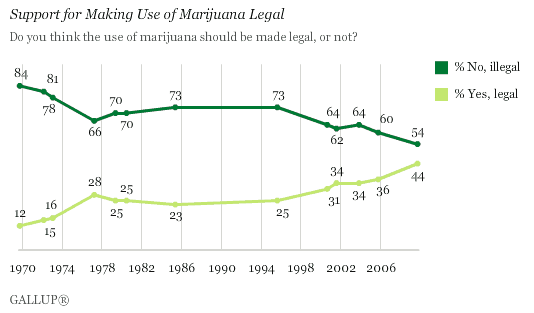
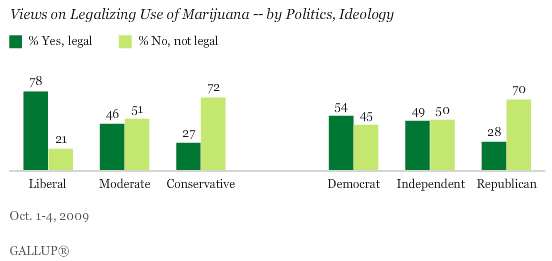



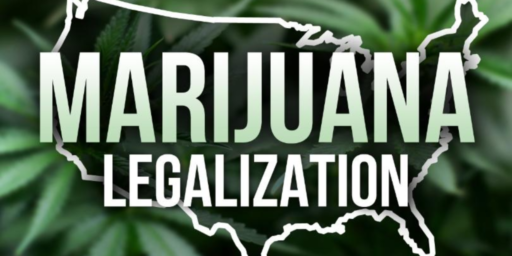
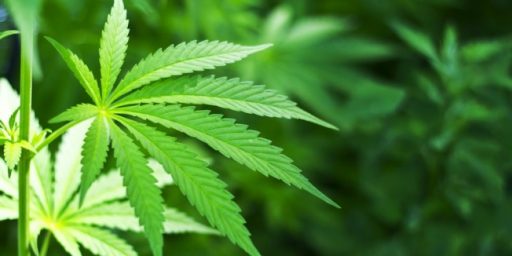
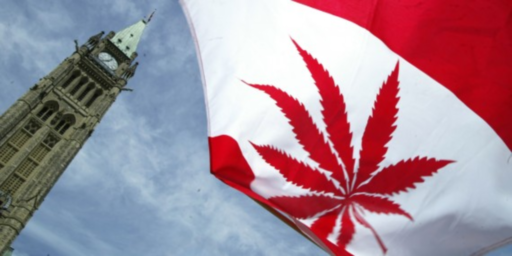
I don’t have a problem with freedom of choice as long as Employers retain the right to terminate anyone under the influence.
Given that a higher percentage of people support marijuana being illegal than supported Obama in 2008 and that a lower percentage of people support making marijuana legal than supported McCain, we aren’t even close to “a slight majority supporting decriminalization”.
I was basing it on Lydia’s assertion that “If public support were to continue growing at a rate of 1% to 2% per year, as it has since 2000, the majority of Americans could favor legalization of the drug in as little as four years.” Even if true, I don’t think it means a policy change.
The ‘if’ probably makes sense given the demographics involved, but you can’t necessarily count on any given time frame. For example, from 1977 to 1985, it looks like support for keeping illegal was growing by 1% a year, not declining. The long term supports the 1% decline over all, but I wouldn’t be surprised to see an uptick on the next poll vs a further decline.
At the ~1%/year rate, you would take about a decade to reverse the situation. And then another decade to make the margins high enough to get around the social barriers you talked about. What would hurt the supporters of legalization the most is to push to early. Like with gay marriages, to early a push can result in a backlash that will make achieving the goal harder (e.g. enshrining the law into the state constitution, thus requiring not just a law but a constitutional repeal of the amendment).
So if the message is that if you wait 20 to 30 years you will likely have an environment that is favorable to legalizing marijuana, I would tend to agree (absent other intervening events). If the message is that marijuana is likely to be legalized in a hypothetical second term of Obama, I doubt that very much.
The term “legal” is too generic.
Does that mean it would be legal to light up outside a bar or at a park or beach? Or while walking your dog outside an elementary school where our precious little children are playing?
I think if making it “legal” is defined as being able to smoke in one’s house and thats it (no smoking in public, carrying it around in public etc), perhaps the numbers would show more support for this kind of circumscribed “legalization”.
The Q brings up an interesting point. By the time we legalize marijuana, we may have reduced the number of places that a person can legally smoke a cigarette to a number approaching zero (unless they own their own house and have large enough yards that it won’t disturb the neighbors. It seems unlikely that as people become less and less willing to be inconvenienced by cigarette smokers that they’re going to be willing to become inconvenienced by pot smokers. Even if, in the abstract, they don’t oppose decriminalization.
James,
I don’t fully agree on your last point. What you are referring to is known as “Social desirability bias”. However, in the polling industry, this type of bias is known to be present in surveys conducted by phone, even if the interviewer is a faceless stranger (albeit less so than if the survey was conducted face-to-face). It is likely that the proportion of Americans for legalization is in fact higher, but tempered by SDB during field.
The fact that we’re near 50-50 on this topic is telling in and of itself. Having said that, I’m not entirely sure than an 80% approval for marijuana legalization would be enough to clinch a policy change, but that’s the cynic in me musing.
A note about the wording of the question: I think Gallup’s wording is very appropriate. The “or not” wording is always preferred when asking yes/no questions on sensitive topics, as it expressly offers a balanced choice. The respondent is not being led either way here.
Your suggestion of asking if it should be made illegal would likely confuse respondents (a common response would be “isn’t it already?”).
Assuming a legalization initiative gets on the ballot in California (where it’s polling at 56%) next year, would you not expect roughly the same percentage to vote for it and therefore pass it? After all, the polls are the most private place to express one’s opinions.
Once the laws become unenforceable, then they will be changed…regardless of whether public opinion wants to retain our prohibition laws or not.
After all, what’s more malleable? Human nature or public opinion?
Consider the effect of over 30 years of the drug war:
On one hand, public opinion shows “support for marijuana legalization at record high,” while meanwhile, marijuana usage has remained about the same.
No surprise there. It seems the only thing prohibition results in…is increased support for repealing prohibition.
To Ham Sammich,
First, don’t get ahead of yourself in Cali – those numbers are likely to subside a bit in the face of vocal opposition, of which there has been none to date.
More broadly, the concern is not so much that it won’t pass in California, and thus set us back, so much as it that it will pass in California, and we’ll see a backlash in other parts of the country that aren’t as “ready” as California.
That’s not to say that I endorse this thinking though. How can there be a “backlash” in terms of legality when it’s already illegal? What are they going to do, increase minimum sentences? Constitutionalize prohibition? Hardly. The worst that can happen is that the opposition in those states gets more vocal than they have been, which will in turn energize support. At that point, we may just have a legitimate debate on our hands, and its about time!